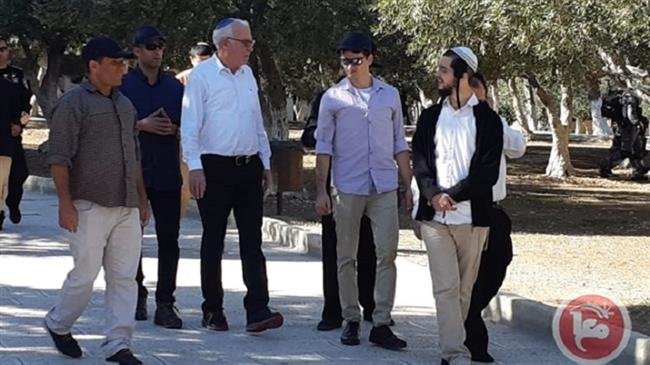
RNA - The Palestinian Ma'an news agency, citing Firas al-Dibs, spokesperson of the Islamic Waqf (Endowment) organization, said Uri Ariel, the minister of agriculture and rural development in the occupied territories, and dozens of other Israeli settlers stormed the compound on Sunday.
Al-Dibs added that the settlers led by Ariel stormed through the Moroccan Gate and toured the compound “provocatively.” A large number of Israeli forces had been deployed across the compound for their protection.
The report said the Israeli minister had previously stormed al-Aqsa Mosque compound in September.
The number of Israeli lawmakers, or members of the Knesset, who storm the sacred compound, has increased in the past few months after Prime Minister Benjamin Netanyahu decided in July to allow the legislators to visit the compound once every three months following a restriction of access that has been in place since October 2015.
Most of the Knesset members are right-wing extremists, who support the demolition of the Islamic site in order to build a Jewish temple instead.
The al-Aqsa Mosque compound sits just above the Western Wall plaza and houses both the Dome of the Rock and al-Aqsa mosque.
Separately on Sunday, a large number of Israeli settlers attacked Palestinian ambulance in the al-Shuhada Street in al-Khalil (Hebron) in the early hours of the day, Ma’an reported.
The report, citing local sources, added that the ambulance was passing through the street to take a Palestinian patient to a nearby hospital, when Israeli settlers started attacking the vehicle by hurling rocks at it.
The ambulance, which belonged to the Palestinian Red Crescent Society (PRCS), received material damage, such as shattered windows, in the attack.
The Palestinian Authority, which runs the occupied West Bank, has no jurisdiction over Israeli settlers in the region and acts carried out by Israelis often occur in the presence of Israeli troops, who rarely intervene to protect Palestinian residents.
Tensions continue in the occupied Palestinian territories as part of the aftermath of US President Donald Trump's recognition of Jerusalem al-Quds as Israel’s "capital" and relocation of the US embassy to the occupied city.
On December 21 last year, the United Nations General Assembly overwhelmingly voted in favor of a resolution that calls on the US to withdraw its controversial policy shift.
Despite the vote, the US went ahead with the embassy transfer on May 14, triggering demonstrations in the occupied Palestinian territories, Iran, Turkey, Egypt, Jordan, Tunisia, Algeria, Iraq, Morocco and other Muslim countries.
Angered by Trump’s move, Palestinian President Mahmoud Abbas boycotted his administration, saying Washington is no longer qualified to serve as the sole mediator in the decades-long conflict with Israel, and that an international mechanism should be devised to replace the US in the so-called peace process.
847/940